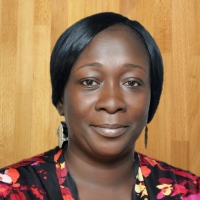Search
News
Meet our Regional team: Afusat
September 18, 2018

Afusat Eke – Social Worker, Nigeria
Our Regional Programme provides humanitarian support to seafarers and their families in three specific regions: South East Asia, South Asia and Nigeria. Meet our representative in Nigeria, Afusat...
Tell us about yourself.
I am Afusat Eke, married with children and living in Lagos. My hobby is reading and I enjoy helping people. I have been on the MPHRP/ISWAN project for two years now as a Social Worker but before then I worked as a Social Worker in a private psychiatric hospital here in Lagos.
What is life like for a seafarer in your region?
Due to high unemployment rate of Nigerian seafarers, the life of an average Nigerian seafarer is quite a difficult one. Seafarers who have managed to finish their sea time find it a difficult task to get a job. Really an average Nigerian seafarer faces a lot of issues due to a lack of work as well as welfare issues for those that do go to sea (e.g. wages, injury, piracy and armed robbery).
How are you able to help seafarers?
As a Social Worker with the National Seafarers’ Welfare Board of Nigeria, it's given me a platform to provide counselling and psychosocial support to traumatised seafarers and their families. I have equally been able to bring awareness to the welfare issue of seafarers and also been able to create awareness of the importance of seafarers being well informed of their role and decisions as seafarers.
What skills are important for your work with seafarers?
The skills I believe are important for this work would be listening, communication and counselling skills, as well as good knowledge and understanding of the Maritime Labour Convention, 2006.
What have you needed to do to help the families of seafarers?
When a seafarer was in hospital for close to one year for treatment of burns sustained while on board, I assisted his family during their ordeal by providing psychosocial support and counselling to them. Through my intervention, the employer was able to put the wife on a monthly allowance for the upkeep of the family.
What is a typical day for you?
A typical day for me varies depending on what I have outlined for the day. On a day for ship visits, I would start work at 8am, follow up calls to seafarers to check on their wellbeing, provide emotional and psychosocial support for those in need of this and follow up on their cases.
I attend the pilotage meetings at the Harbours at Apapa Port to create awareness amongst the agents and shipowners, or I go to the maritime academy to meet with seafarers to create awareness of our work and interview those that have issues. After this, I go on ship visits until close of work.
What is the best part of the work you do?
The best part of my work would be when I’m able to put a smile on the faces of the seafarers and help get them living their lives to the fullest.
Tell us about some of the more memorable cases you have worked on at ISWAN.
The most noteworthy case recently was the five Filipino seafarers released from prison. The five Filipino seafarers were in Ikoyi Prison sentenced to serve five years. I visited them every two weeks and worked with my colleague Jun in the Philippines. He was able to get local Philippine agencies aware of their plight, and we got grants from the Seafarers Emergency Fund to supply clothes, food, toiletries and medication, and maintain contact with their families. They were finally released from prison after finishing their term on the 30 July 2018. I visited them just before they went home and the smiles on their faces was all I needed to see, they were so grateful for the help everybody at ISWAN and NSWB rendered to them and just kept repeating their appreciation.
-
ISWAN highlights support available following fatal Red Sea attack
March 08, 2024 -
New funding for research on social interaction among crew
March 07, 2024 -
Member of the Month: BazePort
February 29, 2024 -
TALKING POINT: Seeing through history: LGBT+ seafarers
February 28, 2024 -
ISWAN’s helplines report quarterly highs for mental health challenges
February 26, 2024 -
Artificial Intelligence as a Human Resource
February 15, 2024 -
TALKING POINT: Work-induced sexual abstinence and seafarer psychological wellbeing
January 31, 2024 -
Here for seafarers over the holidays
December 19, 2023 -
Navigating stress: A holistic approach for seafarer well-being
November 30, 2023 -
ISWAN’s helplines report further increase in contacts relating to abuse, bullying, harassment, discrimination and violence at sea
November 30, 2023 -
Helsinki seminar hears from seafarers and experts on maritime recruitment crisis
November 29, 2023 -
Annual review from international maritime charity highlights challenges faced by seafarers in 2022-23
November 28, 2023 -
TALKING POINT: The interplay of crew wellbeing and environmental impact onboard yachts
November 27, 2023 -
ISWAN 2023 Seminar: Meet our Gold Sponsor - Roll Group
October 30, 2023 -
Responding to the issues voiced by yacht crew
October 17, 2023



